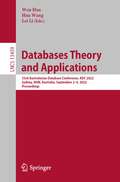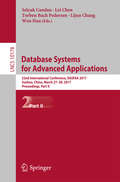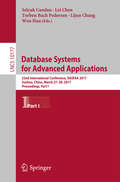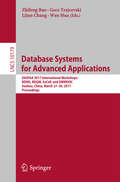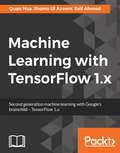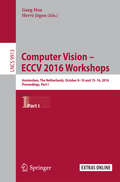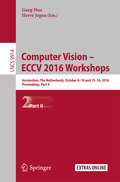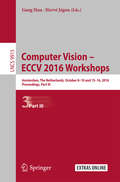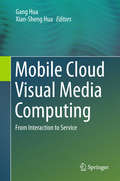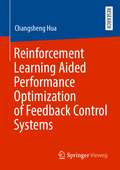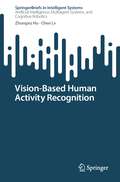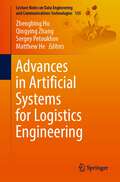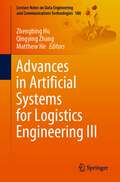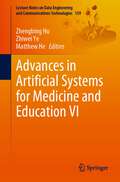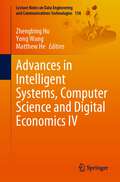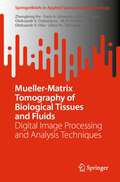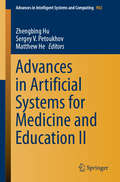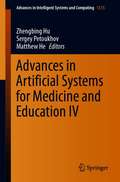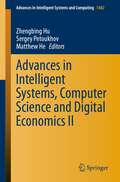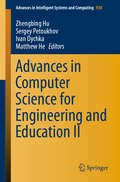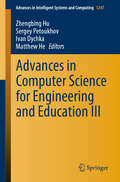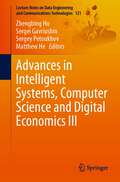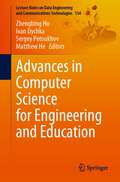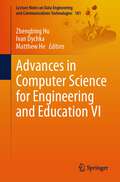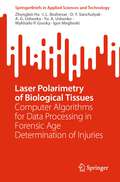- Table View
- List View
Databases Theory and Applications: 33rd Australasian Database Conference, ADC 2022, Sydney, NSW, Australia, September 2–4, 2022, Proceedings (Lecture Notes in Computer Science #13459)
by Wen Hua Hua Wang Lei LiThis book constitutes the refereed proceedings of the 33rd International Conference on Databases Theory and Applications, ADC 2022, held in Sydney, Australia, in September 2022. The conference is co-located with the 48th International Conference on Very Large Data Bases, VLDB 2022. The 9 full papers presented together with 8 short papers were carefully reviewed and selected from 36 submissions. ADC focuses on database systems, data-driven applications, and data analytics.
Database Systems for Advanced Applications: 22nd International Conference, DASFAA 2017, Suzhou, China, March 27-30, 2017, Proceedings, Part II (Lecture Notes in Computer Science #10178)
by Wen Hua Torben Bach Pedersen Lijun Chang Selçuk Candan Lei ChenDASFAA is an annual international database conference, located in the Asia- Paci?cregion,whichshowcasesstate-of-the-artR & Dactivities in databases- tems and their applications. It provides a forum for technical presentations and discussions among database researchers, developers and users from academia, business and industry. DASFAA 2009, the 14th in the series, was held during April 20-23, 2009 in Brisbane, Australia. In this year, we carefully selected six workshops, each focusing on speci?c research issues that contribute to the main themes of the DASFAA conference. Thisvolumecontainsthe?nalversionsofpapersacceptedforthesesixworkshops that were held in conjunction with DASFAA 2009. They are: - First International Workshop on Benchmarking of XML and Semantic Web Applications (BenchmarX 2009) - Second International Workshop on Managing Data Quality in Collaborative Information Systems (MCIS 2009) - First International Workshop on Data and Process Provenance (WDPP 2009) - First International Workshop on Privacy-Preserving Data Analysis (PPDA 2009) - FirstInternationalWorkshoponMobileBusinessCollaboration(MBC2009) - DASFAA 2009 PhD Workshop All the workshops were selected via a public call-for-proposals process. The workshop organizers put a tremendous amount of e?ort into soliciting and - lecting papers with a balance of high quality, new ideas and new applications. We asked all workshops to follow a rigid paper selection process, including the procedure to ensure that any Program Committee members are excluded from the paper review process of any paper they are involved with. A requirement about the overall paper acceptance rate of no more than 50% was also imposed on all the workshops.
Database Systems for Advanced Applications: 22nd International Conference, DASFAA 2017, Suzhou, China, March 27-30, 2017, Proceedings, Part I (Lecture Notes in Computer Science #10177)
by Wen Hua Torben Bach Pedersen Lijun Chang Selçuk Candan Lei ChenDASFAA is an annual international database conference, located in the Asia- Paci?cregion,whichshowcasesstate-of-the-artR & Dactivities in databases- tems and their applications. It provides a forum for technical presentations and discussions among database researchers, developers and users from academia, business and industry. DASFAA 2009, the 14th in the series, was held during April 20-23, 2009 in Brisbane, Australia. In this year, we carefully selected six workshops, each focusing on speci?c research issues that contribute to the main themes of the DASFAA conference. Thisvolumecontainsthe?nalversionsofpapersacceptedforthesesixworkshops that were held in conjunction with DASFAA 2009. They are: - First International Workshop on Benchmarking of XML and Semantic Web Applications (BenchmarX 2009) - Second International Workshop on Managing Data Quality in Collaborative Information Systems (MCIS 2009) - First International Workshop on Data and Process Provenance (WDPP 2009) - First International Workshop on Privacy-Preserving Data Analysis (PPDA 2009) - FirstInternationalWorkshoponMobileBusinessCollaboration(MBC2009) - DASFAA 2009 PhD Workshop All the workshops were selected via a public call-for-proposals process. The workshop organizers put a tremendous amount of e?ort into soliciting and - lecting papers with a balance of high quality, new ideas and new applications. We asked all workshops to follow a rigid paper selection process, including the procedure to ensure that any Program Committee members are excluded from the paper review process of any paper they are involved with. A requirement about the overall paper acceptance rate of no more than 50% was also imposed on all the workshops.
Database Systems for Advanced Applications: DASFAA 2017 International Workshops: BDMS, BDQM, SeCoP, and DMMOOC, Suzhou, China, March 27-30, 2017, Proceedings (Lecture Notes in Computer Science #10179)
by Wen Hua Lijun Chang Zhifeng Bao Goce TrajcevskiThis two volume set LNCS 10177 and 10178 constitutes the refereed proceedings of the 22nd International Conference on Database Systems for Advanced Applications, DASFAA 2017, held in Suzhou, China, in March 2017. The 73 full papers, 9 industry papers, 4 demo papers and 3 tutorials were carefully selected from a total of 300 submissions. The papers are organized around the following topics: semantic web and knowledge management; indexing and distributed systems; network embedding; trajectory and time series data processing; data mining; query processing and optimization; text mining; recommendation; security, privacy, senor and cloud; social network analytics; map matching and spatial keywords; query processing and optimization; search and information retrieval; string and sequence processing; stream date processing; graph and network data processing; spatial databases; real time data processing; big data; social networks and graphs.
Machine Learning with TensorFlow 1.x
by Quan Hua Shams Ul Azeem Saif AhmedAbout This BookEnter the new era of second-generation machine learning with Python with this practical and insightful guideSet up TensorFlow 1.x for actual industrial use, including high-performance setup aspects such as multi-GPU supportCreate pipelines for training and using applying classifiers using raw real-world dataWho This Book Is ForThis book is for data scientists and researchers who are looking to either migrate from an existing machine learning library or jump into a machine learning platform headfirst. The book is also for software developers who wish to learn deep learning by example. Particular focus is placed on solving commercial deep learning problems from several industries using TensorFlow's unique features. No commercial domain knowledge is required, but familiarity with Python and matrix math is expected.What You Will LearnExplore how to use different machine learning models to ask different questions of your dataLearn how to build deep neural networks using TensorFlow 1.xCover key tasks such as clustering, sentiment analysis, and regression analysis using TensorFlow 1.xFind out how to write clean and elegant Python code that will optimize the strength of your algorithmsDiscover how to embed your machine learning model in a web application for increased accessibilityLearn how to use multiple GPUs for faster training using AWSIn DetailGoogle's TensorFlow is a game changer in the world of machine learning. It has made machine learning faster, simpler, and more accessible than ever before. This book will teach you how to easily get started with machine learning using the power of Python and TensorFlow 1.x.Firstly, you'll cover the basic installation procedure and explore the capabilities of TensorFlow 1.x. This is followed by training and running the first classifier, and coverage of the unique features of the library including data ?ow graphs, training, and the visualization of performance with TensorBoard—all within an example-rich context using problems from multiple industries. You'll be able to further explore text and image analysis, and be introduced to CNN models and their setup in TensorFlow 1.x. Next, you'll implement a complete real-life production system from training to serving a deep learning model. As you advance you'll learn about Amazon Web Services (AWS) and create a deep neural network to solve a video action recognition problem. Lastly, you'll convert the Caffe model to TensorFlow and be introduced to the high-level TensorFlow library, TensorFlow-Slim.By the end of this book, you will be geared up to take on any challenges of implementing TensorFlow 1.x in your machine learning environment.
Computer Vision – ECCV 2016 Workshops: Amsterdam, The Netherlands, October 8-10 and 15-16, 2016, Proceedings, Part I (Lecture Notes in Computer Science #9913)
by Gang Hua Hervé JégouThe three-volume set LNCS 9913, LNCS 9914, and LNCS 9915 comprises the refereed proceedings of the Workshops that took place in conjunction with the 14th European Conference on Computer Vision, ECCV 2016, held in Amsterdam, The Netherlands, in October 2016. The three-volume set LNCS 9913, LNCS 9914, and LNCS 9915 comprises the refereed proceedings of the Workshops that took place in conjunction with the 14th European Conference on Computer Vision, ECCV 2016, held in Amsterdam, The Netherlands, in October 2016. 27 workshops from 44 workshops proposals were selected for inclusion in the proceedings. These address the following themes: Datasets and Performance Analysis in Early Vision; Visual Analysis of Sketches; Biological and Artificial Vision; Brave New Ideas for Motion Representations; Joint ImageNet and MS COCO Visual Recognition Challenge; Geometry Meets Deep Learning; Action and Anticipation for Visual Learning; Computer Vision for Road Scene Understanding and Autonomous Driving; Challenge on Automatic Personality Analysis; BioImage Computing; Benchmarking Multi-Target Tracking: MOTChallenge; Assistive Computer Vision and Robotics; Transferring and Adapting Source Knowledge in Computer Vision; Recovering 6D Object Pose; Robust Reading; 3D Face Alignment in the Wild and Challenge; Egocentric Perception, Interaction and Computing; Local Features: State of the Art, Open Problems and Performance Evaluation; Crowd Understanding; Video Segmentation; The Visual Object Tracking Challenge Workshop; Web-scale Vision and Social Media; Computer Vision for Audio-visual Media; Computer VISion for ART Analysis; Virtual/Augmented Reality for Visual Artificial Intelligence; Joint Workshop on Storytelling with Images and Videos and Large Scale Movie Description and Understanding Challenge.
Computer Vision – ECCV 2016 Workshops: Amsterdam, The Netherlands, October 8-10 and 15-16, 2016, Proceedings, Part II (Lecture Notes in Computer Science #9914)
by Gang Hua Hervé JégouThe three-volume set LNCS 9913, LNCS 9914, and LNCS 9915 comprises the refereed proceedings of the Workshops that took place in conjunction with the 14th European Conference on Computer Vision, ECCV 2016, held in Amsterdam, The Netherlands, in October 2016. The three-volume set LNCS 9913, LNCS 9914, and LNCS 9915 comprises the refereed proceedings of the Workshops that took place in conjunction with the 14th European Conference on Computer Vision, ECCV 2016, held in Amsterdam, The Netherlands, in October 2016. 27 workshops from 44 workshops proposals were selected for inclusion in the proceedings. These address the following themes: Datasets and Performance Analysis in Early Vision; Visual Analysis of Sketches; Biological and Artificial Vision; Brave New Ideas for Motion Representations; Joint ImageNet and MS COCO Visual Recognition Challenge; Geometry Meets Deep Learning; Action and Anticipation for Visual Learning; Computer Vision for Road Scene Understanding and Autonomous Driving; Challenge on Automatic Personality Analysis; BioImage Computing; Benchmarking Multi-Target Tracking: MOTChallenge; Assistive Computer Vision and Robotics; Transferring and Adapting Source Knowledge in Computer Vision; Recovering 6D Object Pose; Robust Reading; 3D Face Alignment in the Wild and Challenge; Egocentric Perception, Interaction and Computing; Local Features: State of the Art, Open Problems and Performance Evaluation; Crowd Understanding; Video Segmentation; The Visual Object Tracking Challenge Workshop; Web-scale Vision and Social Media; Computer Vision for Audio-visual Media; Computer VISion for ART Analysis; Virtual/Augmented Reality for Visual Artificial Intelligence; Joint Workshop on Storytelling with Images and Videos and Large Scale Movie Description and Understanding Challenge.
Computer Vision – ECCV 2016 Workshops: Amsterdam, The Netherlands, October 8-10 and 15-16, 2016, Proceedings, Part III (Lecture Notes in Computer Science #9915)
by Gang Hua Hervé JégouThe three-volume set LNCS 9913, LNCS 9914, and LNCS 9915 comprises the refereed proceedings of the Workshops that took place in conjunction with the 14th European Conference on Computer Vision, ECCV 2016, held in Amsterdam, The Netherlands, in October 2016. The three-volume set LNCS 9913, LNCS 9914, and LNCS 9915 comprises the refereed proceedings of the Workshops that took place in conjunction with the 14th European Conference on Computer Vision, ECCV 2016, held in Amsterdam, The Netherlands, in October 2016. 27 workshops from 44 workshops proposals were selected for inclusion in the proceedings. These address the following themes: Datasets and Performance Analysis in Early Vision; Visual Analysis of Sketches; Biological and Artificial Vision; Brave New Ideas for Motion Representations; Joint ImageNet and MS COCO Visual Recognition Challenge; Geometry Meets Deep Learning; Action and Anticipation for Visual Learning; Computer Vision for Road Scene Understanding and Autonomous Driving; Challenge on Automatic Personality Analysis; BioImage Computing; Benchmarking Multi-Target Tracking: MOTChallenge; Assistive Computer Vision and Robotics; Transferring and Adapting Source Knowledge in Computer Vision; Recovering 6D Object Pose; Robust Reading; 3D Face Alignment in the Wild and Challenge; Egocentric Perception, Interaction and Computing; Local Features: State of the Art, Open Problems and Performance Evaluation; Crowd Understanding; Video Segmentation; The Visual Object Tracking Challenge Workshop; Web-scale Vision and Social Media; Computer Vision for Audio-visual Media; Computer VISion for ART Analysis; Virtual/Augmented Reality for Visual Artificial Intelligence; Joint Workshop on Storytelling with Images and Videos and Large Scale Movie Description and Understanding Challenge.
Mobile Cloud Visual Media Computing
by Gang Hua Xian-Sheng HuaThis book explores the internet and mobile ecosystems which are powered by cloud computing - an essential, if not indispensable, part of our everyday lives. Billions of users world-wide use this technology for information sharing, communication and social networking and a high proportion of activity is driven by massive media content such as images, videos and other emerging 3D visual media. However, managing, searching and visualizing this gigantic amount of data to facilitate communication is difficult which has led to an influx of innovation and research in these areas. The research is from academics from all around the world, focusing on the intersection of mobile, cloud, visual and multimedia computing and is split into five clear parts. Topics covered in the book include mobile augmented reality, computational photography, mobile visual recognition and search, and human-computer interaction (HCI). The findings discussed is meant to spur on further creative development in both academia and industry within this area. Mobile Cloud Visual Media Computing would of great interest to researchers and academics wishing to see how the state-of-the-art in media computing research is applied to innovative applications, whilst engineers and software designers from industry will gain an insight into the key set of technologies which support mobile and cloud media computing.
Reinforcement Learning Aided Performance Optimization of Feedback Control Systems
by Changsheng HuaChangsheng Hua proposes two approaches, an input/output recovery approach and a performance index-based approach for robustness and performance optimization of feedback control systems. For their data-driven implementation in deterministic and stochastic systems, the author develops Q-learning and natural actor-critic (NAC) methods, respectively. Their effectiveness has been demonstrated by an experimental study on a brushless direct current motor test rig. The author: Changsheng Hua received the Ph.D. degree at the Institute of Automatic Control and Complex Systems (AKS), University of Duisburg-Essen, Germany, in 2020. His research interests include model-based and data-driven fault diagnosis and fault-tolerant techniques.
Vision-Based Human Activity Recognition (SpringerBriefs in Intelligent Systems)
by Zhongxu Hu Chen LvThis book offers a systematic, comprehensive, and timely review on V-HAR, and it covers the related tasks, cutting-edge technologies, and applications of V-HAR, especially the deep learning-based approaches. The field of Human Activity Recognition (HAR) has become one of the trendiest research topics due to the availability of various sensors, live streaming of data and the advancement in computer vision, machine learning, etc. HAR can be extensively used in many scenarios, for example, medical diagnosis, video surveillance, public governance, also in human–machine interaction applications. In HAR, various human activities such as walking, running, sitting, sleeping, standing, showering, cooking, driving, abnormal activities, etc., are recognized. The data can be collected from wearable sensors or accelerometer or through video frames or images; among all the sensors, vision-based sensors are now the most widely used sensors due to their low-cost, high-quality, and unintrusive characteristics. Therefore, vision-based human activity recognition (V-HAR) is the most important and commonly used category among all HAR technologies.The addressed topics include hand gestures, head pose, body activity, eye gaze, attention modeling, etc. The latest advancements and the commonly used benchmark are given. Furthermore, this book also discusses the future directions and recommendations for the new researchers.
Advances in Artificial Systems for Logistics Engineering (Lecture Notes on Data Engineering and Communications Technologies #135)
by Zhengbing Hu Qingying Zhang Sergey Petoukhov Matthew HeThe book comprises high-quality refereed research papers presented at the Second International Conference on Artificial Intelligence and Logistics Engineering (ICAILE2022), held in Kyiv, Ukraine, on February 20–22, 2022, organized jointly by the National Technical University of Ukraine "Igor Sikorsky Kyiv Polytechnic Institute," Wuhan University of Technology, Nanning University, National Aviation University, and the International Research Association of Modern Education and Computer Science. The topics discussed in the book include state-of-the-art papers in artificial intelligence and logistics engineering. It is an excellent source of references for researchers, graduate students, engineers, management practitioners, and undergraduate students interested in artificial intelligence and its applications in logistics engineering.
Advances in Artificial Systems for Logistics Engineering III (Lecture Notes on Data Engineering and Communications Technologies #180)
by Zhengbing Hu Qingying Zhang Matthew HeThis book comprises high-quality refereed research papers presented at the 3rd International Conference on Artificial Intelligence and Logistics Engineering (ICAILE2023), held in Wuhan, China, on March 11–12, 2023, organized jointly by Wuhan University of Technology, Nanning University, the National Technical University of Ukraine "Igor Sikorsky Kyiv Polytechnic Institute", Huazhong University of Science and Technology, the Polish Operational and Systems Society, Wuhan Technology and Business University, and the International Research Association of Modern Education and Computer Science. The topics discussed in the book include state-of-the-art papers in artificial intelligence and logistics engineering. It is an excellent source of references for researchers, graduate students, engineers, management practitioners, and undergraduate students interested in artificial intelligence and its applications in logistics engineering.
Advances in Artificial Systems for Medicine and Education VI (Lecture Notes on Data Engineering and Communications Technologies #159)
by Zhengbing Hu Zhiwei Ye Matthew HeThe book provides a thorough overview of recent developments in the design of AI systems and their uses in a range of industries, including education, technology, and bioinformatics. The papers in the proceedings were presented at the Sixth International Conference on Artificial Intelligence, Medical Engineering, and Education (AIMEE2022), which took place in Wuhan, China, from August 19 to 21, 2022. The book underlines the need for the intensification of training of an increasing number of appropriate specialists given the rapid growth of AI systems. In order to replicate human and other species' natural intelligence in digital AI systems, the researchers have been studying genetics and inherited biological processes in-depth. These studies offer fresh ideas for developing ever more powerful AI techniques. The featured articles cover a variety of themes in the fields of mathematics and biomathematics, medical approaches, technical and educational approaches, and medical approaches. The book is a compilation of recent academic papers in the discipline, covering a wide range of topics that are important to both business managers and engineers. This proceedings is a fantastic resource for asset management practitioners, researchers, and academics, as well as undergraduate and graduate students who are interested in AI, bioinformatics systems, and their developing applications. This is due to the breadth and depth of the proceedings. Experts, students, and other people who are interested in learning about how AI systems might be used in the future are the target audience.
Advances in Intelligent Systems, Computer Science and Digital Economics IV (Lecture Notes on Data Engineering and Communications Technologies #158)
by Zhengbing Hu Yong Wang Matthew HeThis book comprises high-quality peer-reviewed research papers presented at the 4th International Symposium on Computer Science, Digital Economy and Intelligent Systems (CSDEIS2022), held in Wuhan, China, from November 11–13, 2022, organized jointly by the Wuhan University of Technology, Hubei University of Technology, Wuhan University of Science and Technology, the Polish Operational and Systems Society, and the International Center of Informatics and Computer Science (ICICS). The topics discussed in the book include state-of-the-art papers in computer science and their technological applications; intelligent systems and intellectual approaches; digital economics and educational approaches. It is an excellent source of references for researchers, graduate students, engineers, management practitioners, and undergraduate students interested in computer science and its applications in engineering and management.
Mueller-Matrix Tomography of Biological Tissues and Fluids: Digital Image Processing and Analysis Techniques (SpringerBriefs in Applied Sciences and Technology)
by Zhengbing Hu Yuriy A. Ushenko Iryna V. Soltys Oleksandr V. Dubolazov M. P. Gorsky Oleksandr V. Olar Liliya Yu. TrifonyukThis book presents experimental investigations and digital image processing, highlighting the interaction of polarized radiation with phase-inhomogeneous and optically anisotropic biological layers. The promising and efficient use of vector-parametric description of the formation of polarization-inhomogeneous object fields is noted. Applications of a set of Mueller-matrix polarimetry methods are highlighted. The book includes- structural and logical scheme of multi-parameter (singular, interference and layer-by-layer Stokes-polarimetric), polarization-correlation study of the structure of distributions of the number of singularities, maps of local contrast of interference distributions and layer-by-layer maps of microscopic polarization azimuth and ellipticity; determination of relationships between changes in the magnitude of statistical parameters characterizing polarization-correlation distributions and pathology of prostate tumors.
Advances in Artificial Systems for Medicine and Education II (Advances in Intelligent Systems and Computing #902)
by Zhengbing Hu Sergey V. Petoukhov Matthew HeThis book includes the proceedings of the Second International Conference of Artificial Intelligence, Medical Engineering, Education (AIMEE2018), held in Moscow, Russia, on 6–8 October 2018. The conference covered advances in the development of artificial intelligence systems and their applications in various fields, from medicine and technology to education. The papers presented in the book discuss topics in mathematics and biomathematics; medical approaches; and technological and educational approaches. Given the rapid development of artificial intelligence systems, the book highlights the need for more intensive training for a growing number of specialists, particularly in medical engineering, to increase the effectiveness of medical diagnosis and treatment. The book is intended for specialists, students and other readers who would like to know where artificial intelligence systems can beneficially be applied in the future.
Advances in Artificial Systems for Medicine and Education IV (Advances in Intelligent Systems and Computing #1315)
by Zhengbing Hu Sergey Petoukhov Matthew HeThis book covers the latest advances for the development of artificial intelligence systems and their applications in various fields from medicine and technology to education. The proceedings comprise refereed papers presented at the Fourth International Conference of Artificial Intelligence, Medical Engineering, Education (AIMEE2020), held at the Mechanical Engineering Institute of the Russian Academy of Sciences, Moscow, Russia, in 3–4 October 2020. Given the rapid development of artificial intelligence systems, the book emphasizes the need for the intensification of training of a growing number of relevant specialists, in particular, in medical engineering to increase the effectiveness of medical diagnosing and treatment. In digital artificial intelligence systems, scientists endeavor to reproduce the innate intellectual abilities of human and other organisms, and the in-depth study of genetic systems and inherited biological processes can provide new approaches to create more and more effective artificial intelligence methods. Topics of the included papers concern thematic materials in the following spheres: mathematics and biomathematics; medical approaches; technological and educational approaches. The book is a compilation of state-of-the-art papers in the field, covering a comprehensive range of subjects that is relevant to business managers and engineering professionals alike. The breadth and depth of these proceedings make them an excellent resource for asset management practitioners, researchers, and academics, as well as undergraduate and postgraduate students interested in artificial intelligence and bioinformatics systems as well as their growing applications. Intended readership includes specialists, students, and other circles of readers who would like to know where artificial intelligence systems can be applied in the future with great benefit.
Advances in Intelligent Systems, Computer Science and Digital Economics II (Advances in Intelligent Systems and Computing #1402)
by Zhengbing Hu Sergey Petoukhov Matthew HeThis book comprises high-quality refereed research papers presented at The Second International Symposium on Computer Science, Digital Economy and Intelligent Systems (CSDEIS2020), held in Moscow, Russia, on December 18–20, 2020, organized jointly by Moscow State Technical University and the International Research Association of Modern Education and Computer Science. The topics discussed in the book include state-of-the-art papers in computer science and their technological applications; intelligent systems and intellectual approaches; digital economics and methodological approaches. It is an excellent source of references for researchers, graduate students, engineers, management practitioners, and undergraduate students interested in computer science and their applications in engineering and management.
Advances in Computer Science for Engineering and Education II (Advances in Intelligent Systems and Computing #938)
by Zhengbing Hu Sergey Petoukhov Ivan Dychka Matthew HeThis book gathers high-quality, peer-reviewed research papers presented at the Second International Conference on Computer Science, Engineering and Education Applications (ICCSEEA2019), held in Kiev, Ukraine on 26–27 January 2019, and jointly organized by the National Technical University of Ukraine “Igor Sikorsky Kyiv Polytechnic Institute” and the International Research Association of Modern Education and Computer Science. The papers discuss state-of-the-art topics and advances in computer science; neural networks; pattern recognition; engineering techniques; genetic coding systems; deep learning and its medical applications; and knowledge representation and its applications in education. Given its scope, the book offers an excellent resource for researchers, engineers, management practitioners, and graduate and undergraduate students interested in computer science and its applications in engineering and education.
Advances in Computer Science for Engineering and Education III (Advances in Intelligent Systems and Computing #1247)
by Zhengbing Hu Sergey Petoukhov Ivan Dychka Matthew HeThis book comprises high-quality refereed research papers presented at the Third International Conference on Computer Science, Engineering and Education Applications (ICCSEEA2020), held in Kyiv, Ukraine, on 21–22 January 2020, organized jointly by National Technical University of Ukraine “Igor Sikorsky Kyiv Polytechnic Institute”, National Aviation University, and the International Research Association of Modern Education and Computer Science. The topics discussed in the book include state-of-the-art papers in computer science, artificial intelligence, engineering techniques, genetic coding systems, deep learning with its medical applications, and knowledge representation with its applications in education. It is an excellent source of references for researchers, graduate students, engineers, management practitioners, and undergraduate students interested in computer science and their applications in engineering and education.
Advances in Intelligent Systems, Computer Science and Digital Economics III (Lecture Notes on Data Engineering and Communications Technologies #121)
by Zhengbing Hu Sergei Gavriushin Sergey Petoukhov Matthew HeThe book comprises high-quality refereed research papers presented at the Third International Symposium on Computer Science, Digital Economy, and Intelligent Systems (CSDEIS2021), held in Moscow, Russia, on December 25-26, 2021, organized jointly by the Mechanical Engineering Research Institute of the Russian Academy of Sciences,Moscow State Technical University, and the International Research Association of Modern Education and Computer Science. The topics discussed in the book includes state-of-the-art papers in computer science and their technological applications; intelligent systems and intellectual approaches; digital economics and methodological approaches. It is an excellent source of references for researchers, graduate students, engineers, management practitioners, and undergraduate students interested in computer science and its applications in engineering and management.
Advances in Computer Science for Engineering and Education (Lecture Notes on Data Engineering and Communications Technologies #134)
by Zhengbing Hu Ivan Dychka Sergey Petoukhov Matthew HeThis book contains high-quality refereed research papers presented at the Fifth International Conference on Computer Science, Engineering, and Education Applications (ICCSEEA2022), which took place in Kyiv, Ukraine, on February 21–22, 2022, and was organized by the National Technical University of Ukraine "Igor Sikorsky Kyiv Polytechnic Institute," National Aviation University, and the International Research Association of Modern Education and Computer Science. State-of-the-art studies in computer science, artificial intelligence, engineering methodologies, genetic coding systems, deep learning with medical applications, and knowledge representation with educational applications are among the topics covered in the book. For academics, graduate students, engineers, management practitioners, and undergraduate students interested in computer science and its applications in engineering and education, this book is a valuable resource.
Advances in Computer Science for Engineering and Education VI (Lecture Notes on Data Engineering and Communications Technologies #181)
by Zhengbing Hu Ivan Dychka Matthew HeThis book contains high-quality refereed research papers presented at the 6th International Conference on Computer Science, Engineering, and Education Applications (ICCSEEA2023), which took place in Warsaw, Poland, on March 17–19, 2023, and was organized by the National Technical University of Ukraine "Igor Sikorsky Kyiv Polytechnic Institute”, the National Aviation University, Lviv Polytechnic National University, the Polish Operational and Systems Society, Warsaw University of Technology, and the International Research Association of Modern Education and Computer Science. The book covers a variety of topics, including cutting-edge research in computer science, artificial intelligence, engineering techniques, smart logistics, and knowledge representation with educational applications. The book is an invaluable resource for academics, graduate students, engineers, management professionals, and undergraduate students who are interested in computer science and its applications in engineering and education.
Laser Polarimetry of Biological Tissues: Computer Algorithms for Data Processing in Forensic Age Determination of Injuries (SpringerBriefs in Applied Sciences and Technology)
by Zhengbin Hu I.L. Bezhenar O.Y. Vanchulyak A. G. Ushenko Yu. A. Ushenko Mykhailo P. Gorsky Igor MeglinskiThis book highlights the results of numerical computer-aided smart methods as part of a comprehensive statistical, correlated, and fractal analysis of laser polarimetry. It includes a comprehensive approach to differentiation of lifelong or postmortem origin of injuries and determination of their antiquity based on the analysis of statistical and spatiotemporal frequency evolution of photometric, polarization, and phase parameters of laser images of histological sections of the skin of biomannequins. It discusses the relationship between the coordinate distributions of the intensity of laser images from skin tissues of biomannequins and the nature of its damage. It presents the analysis of relationships between changes in the mean and variance of coordinate distributions of azimuths and ellipticity of polarization images of histological skin sections and the time intervals after injury. Complex differentiation of lifelong and postmortem skin injuries of biomannequins and establishment of their time intervals throughout the entire monitoring interval of changes in the mean and variance of coordinate distributions of phase shifts between orthogonal components of the amplitude of laser images of a series of corresponding histological sections are also presented in this book.
